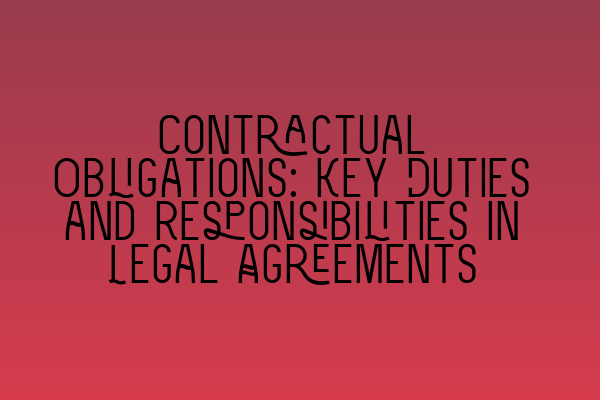Contractual Obligations: Key Duties and Responsibilities in Legal Agreements
Welcome to SQE Contract Law, where we provide expert legal advice and guidance on all aspects of contract law. In this blog post, we will delve into the essential duties and responsibilities that both parties must fulfill when entering into a legal agreement.
Contracts play a vital role in the business world, helping to establish clear rights and obligations between parties. Understanding the key duties and responsibilities outlined within a contract is crucial to ensure compliance and avoid unnecessary disputes. So, let’s explore the fundamental obligations that come with entering into a legally binding agreement.
1. Performance of the Contract
The primary duty in any contract is the requirement for both parties to perform their obligations as stated in the agreement. This means fulfilling all terms and conditions, delivery schedules, payment timelines, and quality standards. For instance, if Party A agrees to deliver a particular product, Party B should pay for it within the specified timeframe.
Related Article: Navigating Legal Challenges and Pitfalls in Your Practice
2. Confidentiality and Non-Disclosure
In many contracts, parties agree to keep certain information confidential and refrain from disclosing it to third parties. This obligation ensures the protection of sensitive trade secrets, intellectual property, and proprietary information. Breaching this duty can have severe consequences, including legal action and reputational damage.
3. Duty of Good Faith and Fair Dealing
Every contract imposes an implied duty of good faith and fair dealing on both parties. This duty requires the parties to act honestly, fairly, and in good faith while performing their obligations. It prevents any party from intentionally undermining the other’s rights or acting deceitfully to gain an advantage.
4. Payment Obligations
In most contracts, one party agrees to pay a certain sum of money or provide compensation in exchange for goods, services, or other considerations. Meeting payment obligations in a timely manner is vital for maintaining trust between parties and avoiding disputes. Failure to fulfill this duty can result in legal consequences, including financial penalties or the termination of the contract.
Related Article: Barrister vs. Solicitor: A Comprehensive Comparison
5. Compliance with Laws and Regulations
A contract does not exempt either party from complying with applicable laws and regulations. It is the duty of both parties to ensure that their actions in performing the contract are in line with legal requirements and industry standards. Failure to comply can result in legal liabilities and reputational damage.
6. Termination and Dispute Resolution
Contracts often outline the process for termination and dispute resolution. Both parties have a duty to follow these procedures if a dispute arises or if one party wishes to terminate the agreement. It is important to carefully review the contract terms to understand the rights and obligations regarding termination and dispute resolution to avoid escalation and unnecessary legal battles.
Related Article: Exploring Different Solicitor Specializations: Finding Your Niche
Conclusion
Understanding the key duties and responsibilities in legal agreements is essential for all parties involved. By fulfilling these obligations, parties can maintain trust, avoid disputes, and ensure smooth business operations. If you require legal advice or assistance regarding any aspect of contract law, do not hesitate to contact the expert team at SQE Contract Law.
Related Articles:
